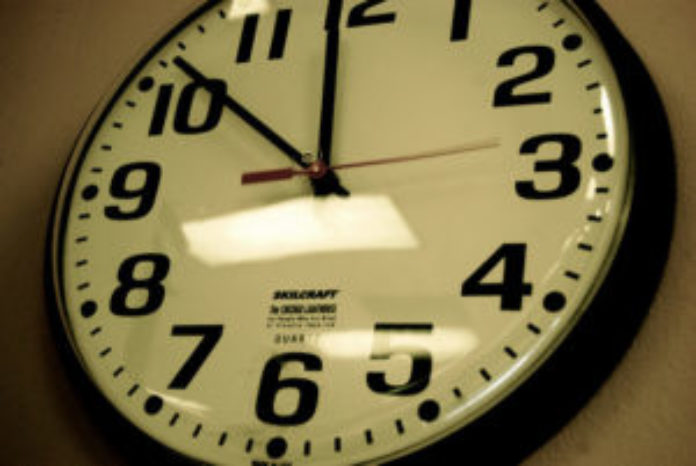A local physician wants Warsaw Community Schools’ parents to know about the health issues and benefits of changing school start times.
Dr. Caitlin Ryser, an OB/GYN at Parkview, said the American Academy of Pediatrics recommends 8-1/2 to 9-1/2 hours of sleep for teens. The National Sleep Foundation found 87% of high school students get less than eight hours of sleep, and 40% of students get six or less hours of sleep.
The sleep deprivation students are getting is causing health issues, she said. One modifiable change that can be made is when the school day begins.
Ryser said there is medical research to back up starting the school day later.
“There is a lot of evidence that when a child hits puberty, the teenage brain starts really seeing melatonin, which is the hormone that causes us to get sleepy, about two hours later than when it was being produced,” she said. Adults produced the hormone about 9 p.m., with teenagers producing melatonin two hours later at 11 p.m.
“This hormone shift causes teenagers to not get sleepy earlier on,” she said. “We make melatonin throughout the night and since there’s a two-hour shift, teenagers continue to make it until 9 a.m.”
“We are asking them to start school, we are asking them to do complex things” like getting ready for school, potentially crossing streets and driving cars “all under the effects of a sedative because melatonin is a sedative and they’re still producing it in their brain until about 9 a.m,” she said.
Ryser said students also could be under the same state of mind in parts of their first few periods of class.
“Studies show associations between early start times in elementary schools and poorer academic performance, as well as increases in behavioral problems,” according to the school start time research and information linked to WCS’ school start times study.
Ryser said the biological shift of melatonin lasts until the person is around 20.
Some of the health issues Ryser cited with sleep deprivation include a higher risk of depression, mood swings, tobacco and alcohol use, obesity, stimulant use and suicide.
Ryser said the number one cause of death in teenagers is auto accidents and the second being suicide. There have been studies that have looked at car accidents and school start time and showed a 60% reduction in teenage car accidents in the community if the school start time is pushed back to about 9 a.m., she said. Pushing back the start time for schools also sees things like a 50% reduction in sports injuries and a 30% reduction in substance abuse.
Ryser stated sleep also affects a teenager’s risk-taking behavior, which includes texting while driving, drinking alcohol, riding without a bicycle helmet, riding with a driver who is under the influence and driving without a seatbelt. The percentage of those behaviors went up if the student had less than eight hours of sleep.
According to slides Ryser used to present her information to the WCS school board last year, the Center of Applied Research of Education Improvement studied 12,000 secondary students for five years after school start times were moved from 7:30 to 8:30 a.m. CAREI saw less depression, increased attendance, reduced tardiness and increased total sleep.
The American Medical Association, Center for Disease Control and American Academy of Pediatrics recommend middle and high schools start no earlier than 8:30 a.m., she said.
Ryser said WCS has the earliest school start time in the area.
The current start time for Warsaw Community High School starts at 7:40 a.m. and ends at 2:50 p.m., according to the 2020-21 school start time options website. Wawasee High School starts at 8 a.m., Triton High School starts at 8:05 a.m., Manchester Jr./Sr. High School starts at 8:15 a.m. and Fort Wayne Community Schools starts at 9:05 a.m.
Ryser said there is no medical evidence saying the current school times are healthy for students and any push back in the start times helps the students.
There are three options WCS is giving the community to vote on. According to WCS Superintendent Dr. David Hoffert, input on the survey will end Friday and the school board will discuss the results during its February school board meeting.
Ryser did present information to the school board at a 2019 school board meeting, and she said her information has been well-received.
In Option A, high schoolers would go from 8:10 a.m. to 3:20 p.m. Option B would have high schoolers go from 7:40 a.m. to 2:50 p.m. Option C would have high schoolers go from 9 a.m. to 4:10 p.m.
According to a McKeever & Clark study in 2017, 29 high schools in seven states were studied. Their initial start times ranged from 7:30 to 8 a.m. and were changed to a range from 8:35 to 9:15 a.m. Before the change, the graduation rates had a mean of 79% and after the later start time change, the mean was 88%, according to slides Ryser provided. Higher graduation rates also affect the community, as well, as it increases the student’s earning potential.
“It benefits every teenager,” she said, but it hits the students in lower socio-economic situations harder as they may not have the same resources as other students as they miss the bus and not have another possible way to get to school, etc.
“Sleep works better than any medicine that I could prescribe,” she said.





